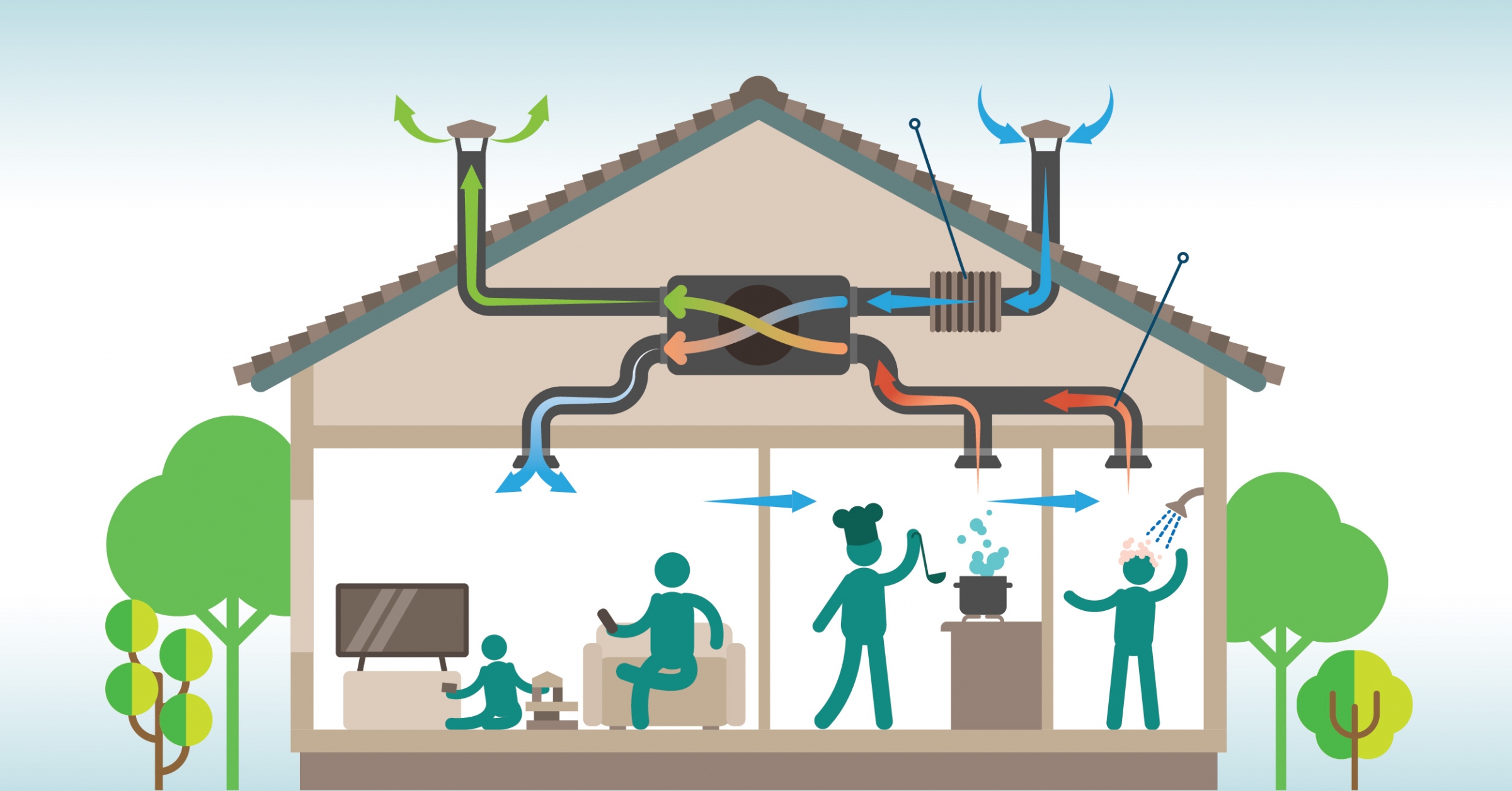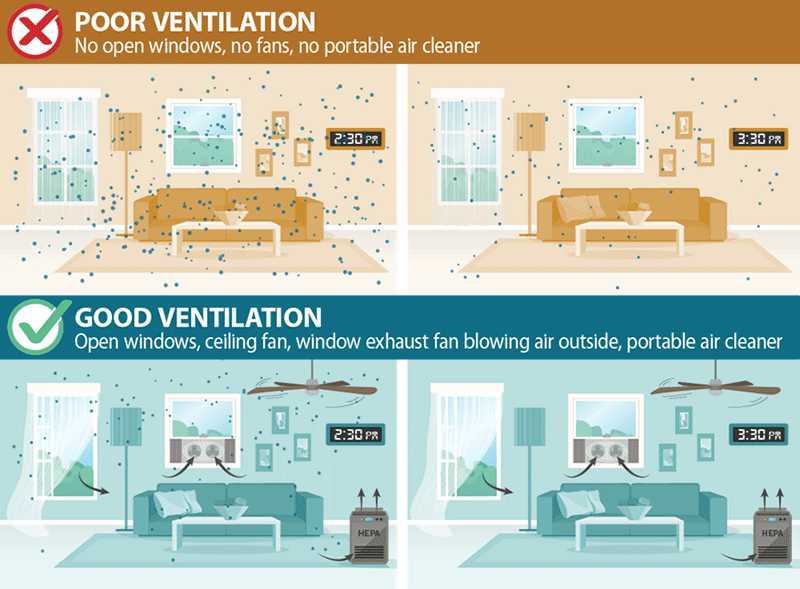How Home Ventilation Melbourne Helps Prevent Mold and Dampness
The Function of Home Air Flow in Protecting Against Mold And Mildew and Indoor Allergens
Home air flow is an important element in keeping a healthy and balanced interior atmosphere. It controls moisture levels, which can prevent the growth of mold and mildew and the build-up of irritants. Many homeowners overlook the value of proper air flow, typically resulting in undetected concerns. Recognizing how air flow systems feature and their effect on air top quality might be the trick to a healthier living room. What actions can be required to boost these systems properly?
Understanding Home Ventilation Solutions
While several home owners might ignore the significance of ventilation, understanding home air flow systems is important for maintaining indoor air top quality and preventing mold growth - Home Ventilation Melbourne. These systems facilitate the exchange of stagnant indoor air with fresh outside air, effectively lowering contaminants and dampness degrees. Typical types include all-natural air flow, which depends on wind and temperature level distinctions, and mechanical ventilation, which utilizes air ducts and fans to manage air movement. In addition, well balanced air flow systems incorporate both techniques to optimize air high quality. Correctly made and kept ventilation systems can help control temperature and moisture, making sure a comfortable living environment. Home owners must take into consideration factors like home design, environment, and occupancy when picking an air flow system to best fit their demands and enhance general air top quality
The Effect of Humidity on Mold And Mildew Growth
Moisture plays a crucial function in mold development, making it a crucial variable for homeowners to check. Mold and mildew flourishes in atmospheres where humidity levels exceed 60%, as these conditions offer the moisture needed for spores to sprout and proliferate. High humidity can result from various resources, consisting of poor air flow, water leakages, and food preparation or showering activities. When moisture levels remain raised, mold and mildew can establish swiftly on natural materials such as material, drywall, and timber. Property owners should utilize dehumidifiers and ensure correct air flow in areas prone to wetness, such as cellars and washrooms. Maintaining indoor moisture in between 30% and 50% can substantially lower the threat of mold and mildew growth, adding to a healthier living environment.
Determining Typical Indoor Allergens
Indoor atmospheres can harbor a variety of allergens that impact health and convenience. Typical interior irritants consist of allergen, animal dander, mold spores, and plant pollen. Dust termites resource flourish in bed linens, rugs, and furniture, eating organic material and adding to respiratory concerns. Animal dander, composed of small flakes from skin and fur, can set off sensitive responses in sensitive individuals. Mold and mildew spores, commonly present in wet areas, can proliferate and affect air quality. Additionally, pollen can infiltrate homes via open home windows or on clothing. Identifying these allergens is vital for maintaining a healthy indoor atmosphere. Recognition of their existence permits property owners to take positive procedures to lessen direct exposure and improve total indoor air high quality.
Benefits of Appropriate Ventilation
Proper ventilation is crucial for preserving a healthy indoor environment, as it helps to control air quality and minimize the buildup of contaminants. Sufficient airflow helps with Discover More the exchange of interior and exterior air, therefore weakening harmful compounds such as unstable natural substances, allergens, and dirt. This process not just boosts convenience however additionally adds to the total wellness of residents by minimizing respiratory concerns (Home Ventilation Melbourne). Proper air flow successfully controls moisture levels, lowering the likelihood of mold and mildew growth and promoting a drier environment helpful to wellness. In addition, it can enhance power efficiency by making certain that heating and cooling systems run better, leading to reduced energy costs. On the whole, correct ventilation is a vital element in advertising a healthy and balanced and safe space

Tips for Improving Home Air Flow
Many house owners might forget it, improving home ventilation is essential for boosting air quality and avoiding mold development. One efficient approach is to routinely open windows to advertise cross-ventilation, enabling fresh air to circulate. Mounting exhaust fans in washrooms and kitchens can efficiently get rid of moisture-laden air, reducing humidity degrees. House owners should likewise think about making use of air purifiers with HEPA filters to capture allergens and toxins. Routinely keeping heating and cooling systems, consisting of altering filters, guarantees come to a head air movement and performance. Securing leakages around doors and windows can prevent outdoors air from getting in, which assists maintain a constant interior setting. Incorporating houseplants can naturally boost air quality while adding visual value to the home.
Often Asked Inquiries
Exactly how Typically Should I Clean My Home Ventilation System?
Figuring out how frequently to cleanse a home air flow system relies on various factors, consisting of usage and environmental problems. Home Ventilation Melbourne. Typically, experts advise a comprehensive cleaning every three to 5 years to keep suitable air flow and efficiency
Can Plant Kingdom Help In Reducing Indoor Allergens?
Research study suggests that specific indoor plants might help reduce allergens by improving air top quality and increasing moisture. Their performance differs, and maintaining a clean setting continues to be necessary for taking care of interior allergens efficiently.
What Sorts Of Air Filters Are Best for Mold And Mildew Prevention?

Exist Details Air Flow Demands for Basements?

Exactly how Do I Know if My Ventilation Is Functioning Successfully?
To determine effective air flow, one ought to monitor moisture levels, examine air flow via vents, and observe indications of condensation or stagnant air. Routine evaluations can indicate whether the system sufficiently flows and exchanges indoor air.
Comprehending just how ventilation systems function and their impact on air top quality could be the secret to a read here much healthier living area. While several property owners may ignore the value of air flow, understanding home ventilation systems is important for preserving indoor air top quality and preventing mold development. Usual kinds consist of natural ventilation, which relies on wind and temperature distinctions, and mechanical air flow, which makes use of air ducts and fans to manage airflow. Appropriate air flow is important for maintaining a healthy indoor atmosphere, as it aids to manage air high quality and minimize the accumulation of contaminants. Lots of house owners may forget it, enhancing home ventilation is vital for enhancing air high quality and stopping mold growth.